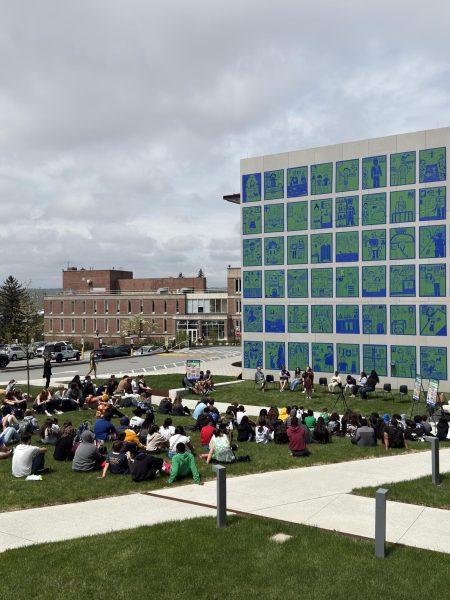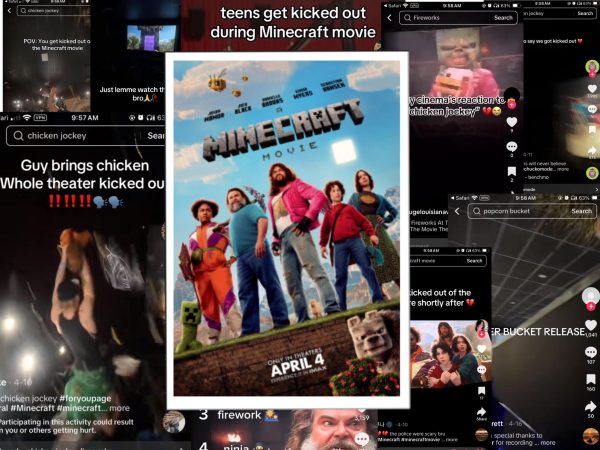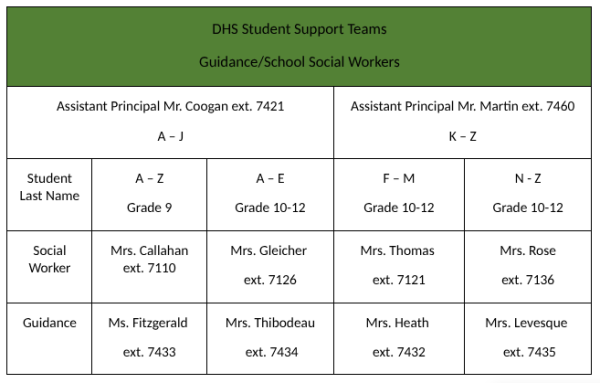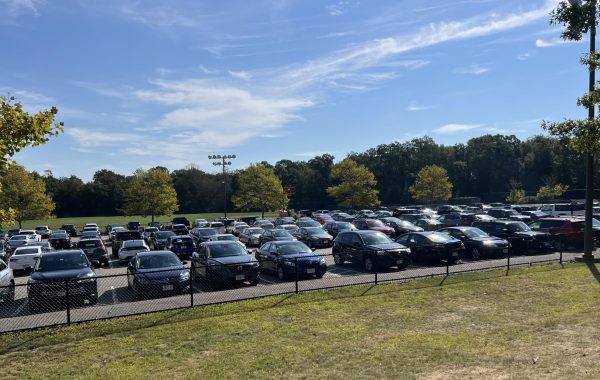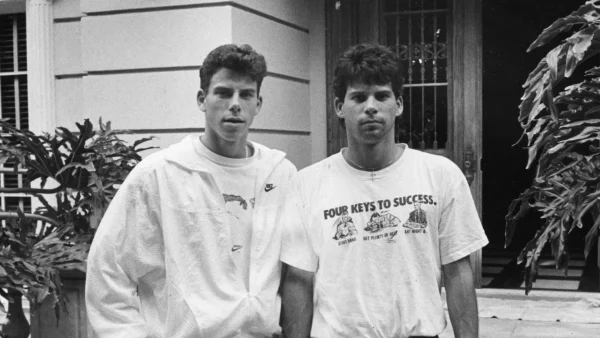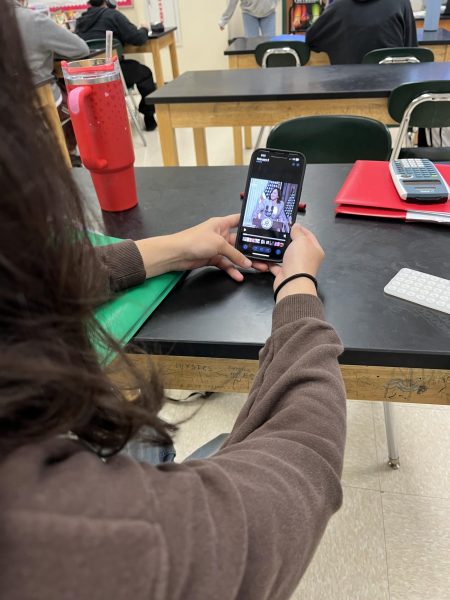Lana Del Rey: The New Album Reviewed
It took me a very long time to warm up to Lana Del Rey’s music (“Brooklyn Baby” is the song that turned me on, and if you haven’t given it a listen, do it), but this last album has solidified my identity as a Del Rey fan. Did You Know There’s A Tunnel Under Ocean Blvd oscillates between catharsis and disillusionment, while incorporating the fantasy of the American West, Neo-Pentecostalism, and the paradoxes of love. Songs like “Sweet” and “Candy Necklaces” incorporate piano riffs immediately recognizable to anyone who has been to church. Those songs aren’t religious in any way, but she brilliantly uses the memory of such piano music to juxtapose the lyrics. The songs are loopy and cryptic, and the album is one that if you get it, you get it, and those who don’t, don’t, to put it bluntly. There are a couple skips, including “Margaret,” because as a general rule Jack Antonoff is a good writer and producer, not a singer, and “Peppers” featuring Tommy Genesis, a song that does not fit with the album’s general narrative. However, the songs mentioned in the article are the heart of the album, making overall the new release a critically acclaimed success.
The album’s title track, “Did You Know There’s A Tunnel Under Ocean Blvd,” is profoundly sad, yet dreamlike. “I can’t help but feel like someone marred my body, my soul,” immediately brings the listener to a time when the wounds are still raw, from a relationship recognized retrospectively as unfulling. Yet the song quickly brings us to the middle of the relationship, when she thought the relationship could heal her. Del Rey references a girl who sings “Hotel California” in the next verse, alluding to the entrapment and self-sabotage depicted in the Eagles song, along with the seductive American West, a contrast between tragedy and scenery Del Rey uses often. The long-winded title sets the tone for the rest of the album, with all of the songs running well over the standard 2:30, and the extended metaphors that allude to religion, destiny, womanhood, and the American identity that are in the underbelly of every track on the album.
Next on the album is “Sweet,” an underrated ballad, evoking memories of church, Sylvia Plath, and Elton John? This song is the personification of what it’s like to be elusive, free-spirited, philosophical, and worse — in love. Her voice has an airy, breathy quality, that is purposefully natural and vulnerable while asking desperately for answers about their future together. The following track, “A&W,” also released before the album, is definitely not about soda. The song starts with a haunting guitar and piano prelude. The accompaniment feels like driving through your hometown years after leaving, memories continuously flowing through the car windows, none being focused on for long before being replaced with another. This is when I knew this album would be like nothing ever before. The song touches on the relationship with her mother, of having her work overshadowed by a man, “asking for it,” and how her appearance affects her credibility. The chorus mimics the 70s sound of the Beatles, but the lyrics are poignantly modern. This song was an early favorite, until about the fourth minute, when the beat drops and she sings a remixed version of the 50s song, “Shimmy Shimmy KoKoBop,” which is whiplash-inducing the first go round. After this the “Judah Smith Interlude” happens, a preaching session of Christianity with Lana’s laughing overlaid, but skip this, delete it from your library, it’s purely for aesthetic value.
“Candy Necklaces,” featuring pianist Jon Batiste, is a song at first that is unperceivable, singing about cinnamon, “Rockafellas,” and candy necklaces. “Hate to say the word but, baby, hand on the Bible I do/ Feel like it’s you the one who’s bringin’ me down,” in verse two, reveals the song’s deeper meaning concerning a relationship that is destructive, yet addicting, like candy necklaces that have to be broken to be eaten.
But definitely towards the top of my list of the best songs of all time is “Kintsugi.” For context, Kintsugi is the Japanese art of mending broken pieces of pottery together with gold, like in the Apple Tv+ series Ted Lasso and The Essex Serpent. You have to break a little, to open up, and let people in is the paramount message of the chorus, “that’s how the light shines in.” The song is raw in its emotion, its self-disclosure, pleading, and admittance. Every crack in the glass caused by the trauma and pain that is synonymous with growing up, is answered with, “I’ve had to let it break a little more/ cause they say that’s what it’s for.” Every single line resonates with the soul, in a painfully true way.
“Paris, Texas” featuring SYML, is eerie in a similar way to “A&W” before its transition, and is the ideal song to twirl around in a flowing nightgown and fall intimately in love with a person or ideal. The vocals are whispery and anonymous, among the ambient and biphonic melody. The song follows the narrative of moving and starting again somewhere new. The song references American ideals, but solely in the background of the bigger picture of artistry. “Grandfather Please Stand on the Shoulders of My Father While He’s Deep Sea Fishing,” featuring RIOPY, is another song with a title so long, you might need a mnemonic device to remember it. The song addresses the rumors of being a manufactured star, something critics have speculated since her debut, and ambiguously talks about fishing for sharks. “A fallible deity wrapped up in white/ I’m folk, I’m jazz, I’m blue, I’m green/ regrettably also a white woman,” features a confusing word salad, of music genre, religion, and sociopolitical climate, yet the meaning is there undeniably, if you’re everything, part of you is also nothing, because you can’t identify as one thing.
“Fingertips,” is a tragedy, a remembrance of the tearing of innocence, and familial betrayal. Del Rey’s voice is mellow, melancholic, and slurred, and takes the listener back to a time of paralyzing loss, which is rushed time after time. Often when a traumatic event occurs, we find ourselves hitting fast-forward on our life, leaving moments unprocessed, grief unsung, while trying to make things normal again, this song captures that. Of all the songs, the lyrics in “Fingertips,” are the most important to fully understand and appreciate, and it’s hard to pick just one or two lines to encapsulate the true essence of the song. The song reads like a letter of admittance, of truth never before spoken.
This song also made it to the best of all time list, and may even surpass “Kintsugi,” and is definitely my most listened to song on the album. “Let the Light In,” featuring Father John Misty, again has the easy-going vibe of The Beatles, who are mentioned in the song, and the quality of a timeless duet. I find myself humming the song, singing it unwittingly, like a childhood favorite song that’s ingrained in memory and nostalgia. The song feels like a sunrise on a frost-coated morning with the smell of coffee grounds in the air, naturally divine.
“You wanted me sadder.” Lana Del Rey, from the songs on UltraViolence has been a self-proclaimed sad-girl, reveling in the lore surrounding melancholic femininity that dates back to Shakespeare’s Ophelia. “Fishtail” is a verbal reflection of a man who only found her attractive whilst in pain, who was manipulative in his adoration. The romance was soundtracked by jazz singer Ella Fitzgerald according to the song, and similarly encapsulating. “I like how you talk, how you speak, how you look at me/ but lately, I can see/ you wanted me sadder.” The song is the manifestation of the worst fears that come along with relationships, of having a relationship only built out of a sense of pity from the other person, that is conditional to how much you need them.
The Official Top Five Songs:
- “Let the Light In (featuring Father John Misty)”
- “Kintsugi”
- “Paris, Texas (featuring SYML)”
- “Fingertips”
- “Candy Necklace (featuring Jon Batiste)”

